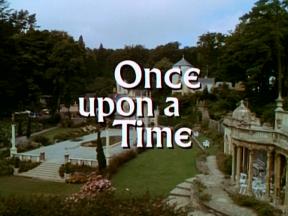 Once Upon A Time
Once Upon A TimeTransmission Date: 26/1/1968
Episode Length: 48'35m (DVD timing)/50'30m (Blu-Ray timing)
Est. Ratings: 9.2m
Written by: Patrick McGoohan
Directed by: Patrick McGoohan
DVD availability: Try amazon.com
Production Commenced:
Exact production start date unknown, believed December 1966
Production Credits:
An ITC Production by Everyman Films Ltd. Executive Producer: Patrick McGoohan; Script Editor: George Markstein; Producer: David Tomblin; Production Manager: Bernard Williams; Director of Photography: Brendan J. Stafford B.S.C.; Art Director: Jack Shampan; Camera Operator: Jack Lowin; Editor: Lee Doig; Theme: Ron Grainer; Incidental Music: Albert Elms; Assistant Director: Gino Marotta; Sound Editor: Wilfred Thompson; Sound Recordist: John Bramall; Music Editor: Eric Mival; Casting Director: Rose Tobias-Shaw; Continuity: Doris Martin; Set Dresser: Kenneth Bridgeman; Make-Up: Eddie Knight; Hairdressing: Pat McDermot and Wardrobe: Masada Wilmot. Made on location and at Metro-Goldwyn-Mayer Studios, Borehamwood, England.
Starring:
Patrick McGoohan (The Prisoner); Leo McKern (Number Two); Angelo Muscat (The Butler); Peter Swanwick (Supervisor); John Cazabon (Umbrella Man) and John Maxim (Number Eighty Six)
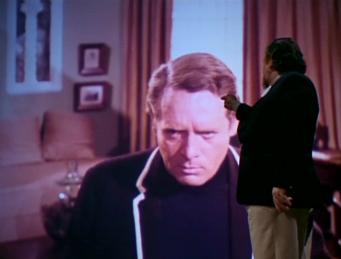
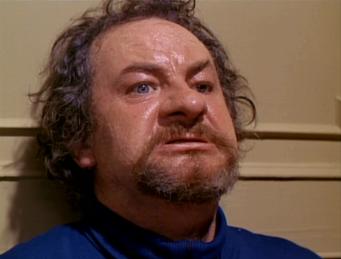
Episode Order:
What's interesting about Once Upon A Time is that it was the sixth to be shot, and reputedly made as a possible ending to a first season. How another season could have come off the back of this climatic episode has always puzzled me, but nevertheless with the curtailing of the second season to just four episodes made, this became the penultimate story, with Pat given a single episode to complete the series after it. It's a little strange watching the different production standards of an episode that was made up to a year earlier than the ones that surround it, not to mention the jarring appearance of McKern between this and Fall Out, or the sudden resurrection of Rover. Nevertheless, Once Upon A Time, despite its origins, is indeed the penultimate episode...
No.6:
More mention is made of No.6's resignation in this episode than any other. He claims the reason behind his resignation is a "confidential state secret" and "above the law". Later he gives reasons for leaving as "for peace... for peace of mind"; "too many people know too much. I know too much. I know too much about you (No.2). You're an enemy"; "I rejected".
The war is mentioned, No.2 claiming that No.6 killed during the war. No.6 claims he killed "for peace", while No.2 argues that he did it "for fun". No.6 also claims to have been "very good at mathematics".
Significantly, perhaps, the only times No.6 loses his temper during the psychological battle are:
1. When asked about his resignation; 2. When called a coward or made to say the number "six" and 3. When No.2 mentions his father.
In The Village:
The Village has an "embryo room" where prisoners can be regressed through life, located underneath No.2's control chamber. It is accessed by travelling down on one of the dias, then along a conveyor belt to the end of a corridor.
The embryo room has a detachable cell room, stocked with amenities, including alcohol that No.2 claims is "100% proof". Intriguingly, the dwarf butler appears to be slightly deaf, No.2 having to shout orders twice at him during the opening of the episode.
Rover:
Rover makes a return appearance in this episode. (Though of course, in the production order, this episode was made before Rover was ever "deactivated" in The Schizoid Man) We see it gyrating in No.2's globe chair, which seems to be a perfect fit. "You can take that thing away", yells No.2 to someone (presumably No.1) on the phone. "I'm not an inmate".
Storyline:
The No.2 from The Chimes of Big Ben is brought back to the Village in another attempt to break No.6. He tells the authorities that they were using the wrong approach, and demands, after scanning his progress report, that he and No.6 undertake "Degree Absolute". As he ruefully explains "You must risk either one of us. I am a good man. I was a good man. But if you get him he will be better and there's no other way". He is authorised to undertake it for a single week, and is locked in the Embryo Room in order to carry it out.
Before attending he brainwashes No.6 by use of the "pulsator" lamps (and later by a very cheap hairdryer with a lightbulb fitted in it) and sings him nursery rhymes (Humpty Dumpty, Jack and Jill, The Grand Old Duke of York and, later, See Saw Marjorie Daw). No.6 awakes, his mind regressed to childhood. From this point No.2 takes him back through Shakespeare's "seven ages of man" (notably omitting the age of the lover) in an attempt to discover why No.6 resigned.
Escape:
Throughout the psychological warfare a spotlight shines on No.6, apparently keeping him under its influence. However, when he begins to win the battle (at 38'38 minutes into the episode) the spotlight turns on No.2.
With time running out, No.2 has cracked, No.6 victorious. Seemingly aware of what is to come in the next episode, No.6 counters a "he (the butler) thinks you're the boss now" with "I am", and, later "No.1's the boss".
No.2's heart stops and the Supervisor enters the chamber to find him dead at No.6's feet. "What do you desire?" he asks No.6. "No.1".
Trivia:
The intense psychological battle between No.2 and No.6 took its toll on Leo McKern and three days were lost as the actor remained in his dressing room, having undergone a slight mental breakdown.
A 90 second montage of clips from four of the five episodes filmed prior to this one are used. Only Checkmate is unrepresented, with Free For All in particular getting a lot of airtime. Actor John Cazabon is credited here with the role of "Umbrella Man", though the scene involving him was excised from the final cut. Even with his involvement, this is still the episode that required the least number of actors.
The meaning of the phrase "pop goes the weasel" (hummed by the Queen in the McGoohan-penned scene from Checkmate and used as an instrumental jazz motif in Arrival) is finally revealed here. The "pop" stands for Protect Other People.
Things to look out for in this episode include a badly-dubbed line from McKern. His line "one teeny week" has an extra word noticably overlaid making it "one teeny weeny week". Also of note is an extra that leaves the control room. The brunette that walks to the left of the picture 410 seconds into the story appears to be wetting herself. (With laughter, natch, not literally urinating in her skirt). Finally, the episode was written by McGoohan in just thirty-six hours.
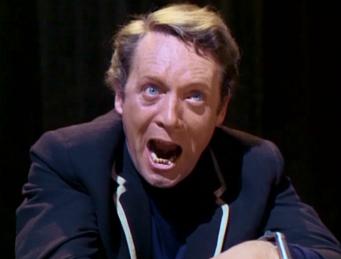
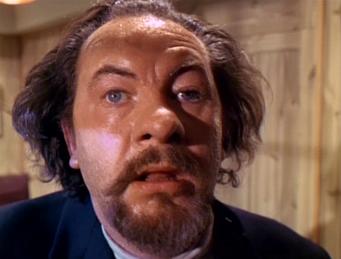
"You can do it all, boy, you're the one-man band. You won't step over the threshold because you're scared."
Viewpoint:
Quite simply my favourite episode of The Prisoner. Should we recommend a piece of television on the strength that making it caused one of its stars (McKern) to have a nervous breakdown? Possibly not, but the manic, almost nonsense, intensity adds everything to this minimalist play and almost every word out of McKern�s mouth sounds like the best dialogue you�ve ever heard. Even the mundane is elevated to the eminently quotable thanks to his full kilter performance.
Patrick hangs with him on the single sparse set, never going as far into the character as to induce a breakdown of his own, but giving us enough intensity to be McKern�s perfect sparring partner. An episode that asks �what is a man?� and questions what lies within, only to repulse viewers with a truly disturbing ending. What must television audiences of 1968 have made of two men in a room yelling Beckettian dialogue at one another for the best part of an hour? Exceptional television.




